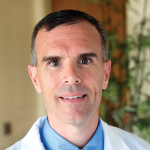Need to drop a few pounds, but want to do it in a way that sets you up for success? Find out what doctors and health professionals have to say about it.
By Katherine Ladny Mitchell
It Starts with Your Mind and Emotions
Doctors say weight loss begins with a reasonable approach. Those who want sustainable results will need to make sustainable changes over time. “Unrealistic expectations as to how fast or how much we can lose set us up for disappointment and make us less likely to stick to any good changes we’ve made,” says Dr. Chris Sanborn, director of Metabolic and Bariatric Surgery at Erlanger Health System. “Weight loss will often be slower and less dramatic than what we’ve been conditioned to expect from magazines and TV.”

Director, Metabolic and Bariatric Surgery, Erlanger Health System
Another tenant of successful weight loss is the understanding that your emotions can play a role. For many, it could be important to work through any emotional difficulties or life stressors before diving into a new regimen.
“Eating and/or overeating can easily be linked to depression or discouragement and not appetite,” says Dr. Mark Crago, a family medicine physician with CHI Memorial Family Practice Associates Ooltewah. “It’s important to find out whether there may be underlying behavioral health issues going on before diving into a new scheme.” Recognizing whether you turn to food to relieve unhappiness, anxiety, or boredom can go a long way when it comes to making sustainable changes.
Developing and creating a support system for yourself can be another key to your success. Identifying encouraging friends, joining a weight-loss group, or working with health professionals in person can go a long way in helping you be consistent. “To do any weight loss program with somebody else is always the best way,” says Dr. Crago. “You’ll have a much higher chance of being successful.”

CHI Memorial Family Practice Associates Ooltewah
It’s About Small Changes Over Time
So how do you lose weight? The gold standard is still the same: to reduce your calorie intake while increasing your activity level (burning calories). However, the amount of calories you will need to reduce per day through diet and exercise in order to lose weight at a healthy rate will depend on your unique makeup – that’s why it’s important to consult with a doctor, trainer, and/or nutritionist.
When going about eliminating calories, writing down concrete, detailed goals can help you evaluate and measure your progress. Many professionals suggest setting a reasonable long-term goal, (“lose 10% of my body weight”), and then breaking that into several short-term goals you can meet on a daily or weekly basis (“eat an apple instead of a candy bar”).
“It’s so easy to bite off more than you can chew with diet and exercise regimens, and then get overwhelmed and quit when regular ‘life’ gets in the way,” says Thomas Morrison, personal trainer and fitness coordinator with Hamilton Health Care System’s Bradley Wellness Center. “The way to truly work smarter and not harder is to remember ‘less is more.’ The fastest way to reach your goals is to change one habit at a time. People don’t always like that because it seems too slow, but over 12 months each small change really adds up.”

Eat, Just Eat Better
Changing the way you eat begins with taking an honest look at your current diet and eating habits. Your doctor or registered dietitian can then help assess your current physical condition and direct you toward the best eating plan for you.
Contrary to what you might think, doctors and nutritionists are not asking anyone to go hungry. Instead, diet is more about changing what you eat and the way you eat it. “If you’re hungry, eat. Just eat better,” says Dr. Sanborn. “A lot of the processed and refined foods we eat may drive our appetite for more of the same. So changing the diet to include more fresh foods is one of the best strategies out there.”

Personal Trainer and Fitness Coordinator, Bradley Wellness Center, Hamilton Health
Care System
Morrison agrees. “White sugar, flour, and oils provide a lot of excess calories without any worthwhile nutrition and they affect our bodies at the cellular level bringing us into various degrees of dependence. This has to change if losing weight is the goal.”
The best nutrition plans find ways to eat more fruits, vegetables, lean proteins, and heart-healthy fats. A nutritionist or doctor can help you develop a balanced diet that neither bans certain foods (like fats and carbs) nor over-emphasizes eating a single food group to the detriment of your health.
To achieve this practically, though, usually means planning healthy meals ahead of time so you don’t consume extra calories just for the sake of convenience. “Every successful ‘body transformer’ has food preparation strategies,” says Morrison. “It’s about setting aside time for packing healthy lunches and snacks, and for preparing food in advance so that you can just grab it during the week.”
Exercise Leads the Charge
Doctors say the benefits of exercise go well beyond just burning calories. “Increasing activity also helps provide a drive for healthier choices and can help stimulate a more active lifestyle in general,” says Dr. Sanborn.
For the best results, begin finding ways to incorporate more exercise into your regular schedule. Start out with small changes and gentle exercises, building up your duration and intensity over time. Make specific goals (walk for 15 minutes during lunch breaks) so you can record your progress. Shoot for 150 minutes of aerobic activity and two sessions of strength training per week.
Morrison says strength training is vital if you want your weight loss to be almost entirely fat loss. “With any diet you will lose lean weight and muscle, as well as the fat you want to lose—unless you give the body a reason to keep the muscle through resistance exercise,” he says.
Forget Fads and Fixes
Research shows no single product or pill used alone has proven to deliver fast, sustainable, healthy weight loss. Additionally, questionable weight-loss methods can rob the body of important nutrients and increase the risk for gallstones, dehydration, electrolyte imbalances, and other problems such as hair and muscle loss, headaches, and fatigue. The truth is that most people regain weight lost once the treatment or diet ends. Permanent results require permanent change.
“Don’t starve, or go on a temporary ‘diet’,” says Dr. Sanborn. “First, ‘going on a diet’ implies that you will go off the diet at some point when your changes should really be permanent. Second, the human body’s defenses against starvation include a host of hormonal responses that turn on hunger drive and turn down the metabolic rate. Going on and off diets leads to a ‘yo-yo’ effect associated with even more weight gain overall.”
Dr. Crago agrees. “The problem didn’t show up overnight so it’s not going to be fixed overnight. Take it one day at a time and expect results over time. There will be setbacks at times, but you can absolutely see progress if you are patient!”
Sources: American Heart Association;
Centers for Disease Control and Prevention;
Gallup; National Institutes of Health




